Nursing Assignment Reflection
VerifiedAdded on 2019/10/31
|6
|1499
|158
Essay
AI Summary
The assignment content discusses the importance of effective communication in mental health nursing, specifically when dealing with patients who have needle phobias. The writer reflects on their own experience where they were unable to obtain a blood sample from a patient due to his fear of needles. They recognize the need to develop communication skills and techniques to overcome such situations in the future.
Contribute Materials
Your contribution can guide someone’s learning journey. Share your
documents today.
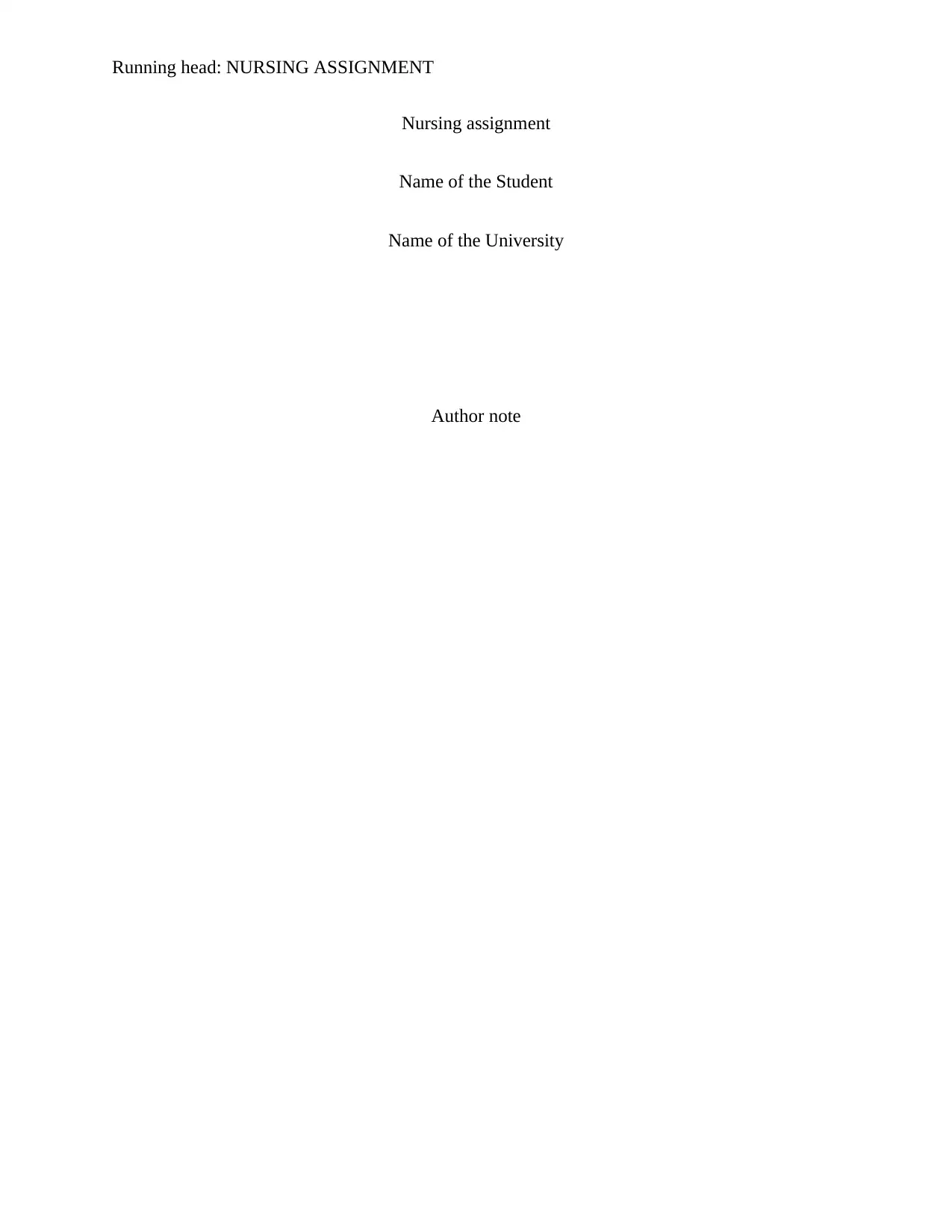
Running head: NURSING ASSIGNMENT
Nursing assignment
Name of the Student
Name of the University
Author note
Nursing assignment
Name of the Student
Name of the University
Author note
Secure Best Marks with AI Grader
Need help grading? Try our AI Grader for instant feedback on your assignments.
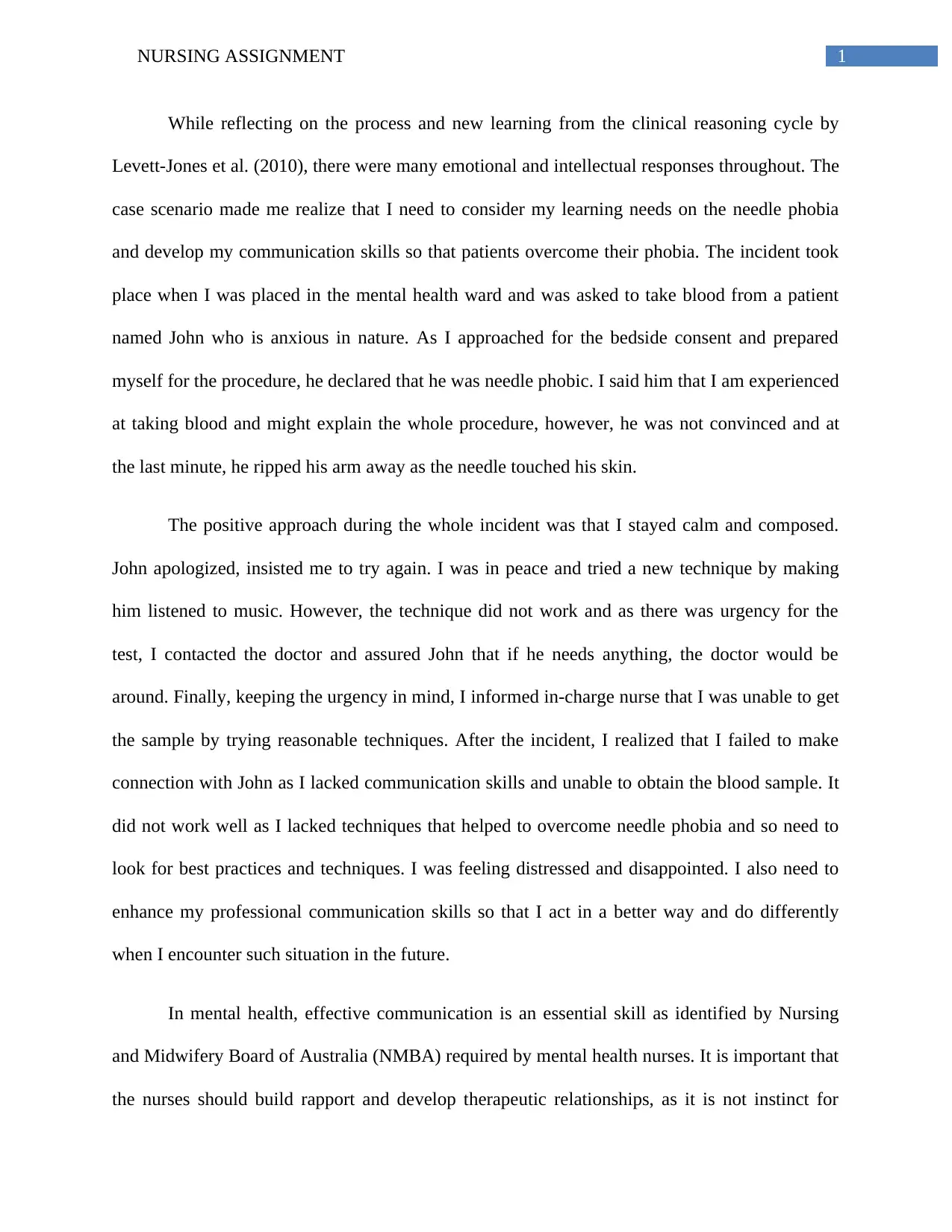
1NURSING ASSIGNMENT
While reflecting on the process and new learning from the clinical reasoning cycle by
Levett-Jones et al. (2010), there were many emotional and intellectual responses throughout. The
case scenario made me realize that I need to consider my learning needs on the needle phobia
and develop my communication skills so that patients overcome their phobia. The incident took
place when I was placed in the mental health ward and was asked to take blood from a patient
named John who is anxious in nature. As I approached for the bedside consent and prepared
myself for the procedure, he declared that he was needle phobic. I said him that I am experienced
at taking blood and might explain the whole procedure, however, he was not convinced and at
the last minute, he ripped his arm away as the needle touched his skin.
The positive approach during the whole incident was that I stayed calm and composed.
John apologized, insisted me to try again. I was in peace and tried a new technique by making
him listened to music. However, the technique did not work and as there was urgency for the
test, I contacted the doctor and assured John that if he needs anything, the doctor would be
around. Finally, keeping the urgency in mind, I informed in-charge nurse that I was unable to get
the sample by trying reasonable techniques. After the incident, I realized that I failed to make
connection with John as I lacked communication skills and unable to obtain the blood sample. It
did not work well as I lacked techniques that helped to overcome needle phobia and so need to
look for best practices and techniques. I was feeling distressed and disappointed. I also need to
enhance my professional communication skills so that I act in a better way and do differently
when I encounter such situation in the future.
In mental health, effective communication is an essential skill as identified by Nursing
and Midwifery Board of Australia (NMBA) required by mental health nurses. It is important that
the nurses should build rapport and develop therapeutic relationships, as it is not instinct for
While reflecting on the process and new learning from the clinical reasoning cycle by
Levett-Jones et al. (2010), there were many emotional and intellectual responses throughout. The
case scenario made me realize that I need to consider my learning needs on the needle phobia
and develop my communication skills so that patients overcome their phobia. The incident took
place when I was placed in the mental health ward and was asked to take blood from a patient
named John who is anxious in nature. As I approached for the bedside consent and prepared
myself for the procedure, he declared that he was needle phobic. I said him that I am experienced
at taking blood and might explain the whole procedure, however, he was not convinced and at
the last minute, he ripped his arm away as the needle touched his skin.
The positive approach during the whole incident was that I stayed calm and composed.
John apologized, insisted me to try again. I was in peace and tried a new technique by making
him listened to music. However, the technique did not work and as there was urgency for the
test, I contacted the doctor and assured John that if he needs anything, the doctor would be
around. Finally, keeping the urgency in mind, I informed in-charge nurse that I was unable to get
the sample by trying reasonable techniques. After the incident, I realized that I failed to make
connection with John as I lacked communication skills and unable to obtain the blood sample. It
did not work well as I lacked techniques that helped to overcome needle phobia and so need to
look for best practices and techniques. I was feeling distressed and disappointed. I also need to
enhance my professional communication skills so that I act in a better way and do differently
when I encounter such situation in the future.
In mental health, effective communication is an essential skill as identified by Nursing
and Midwifery Board of Australia (NMBA) required by mental health nurses. It is important that
the nurses should build rapport and develop therapeutic relationships, as it is not instinct for
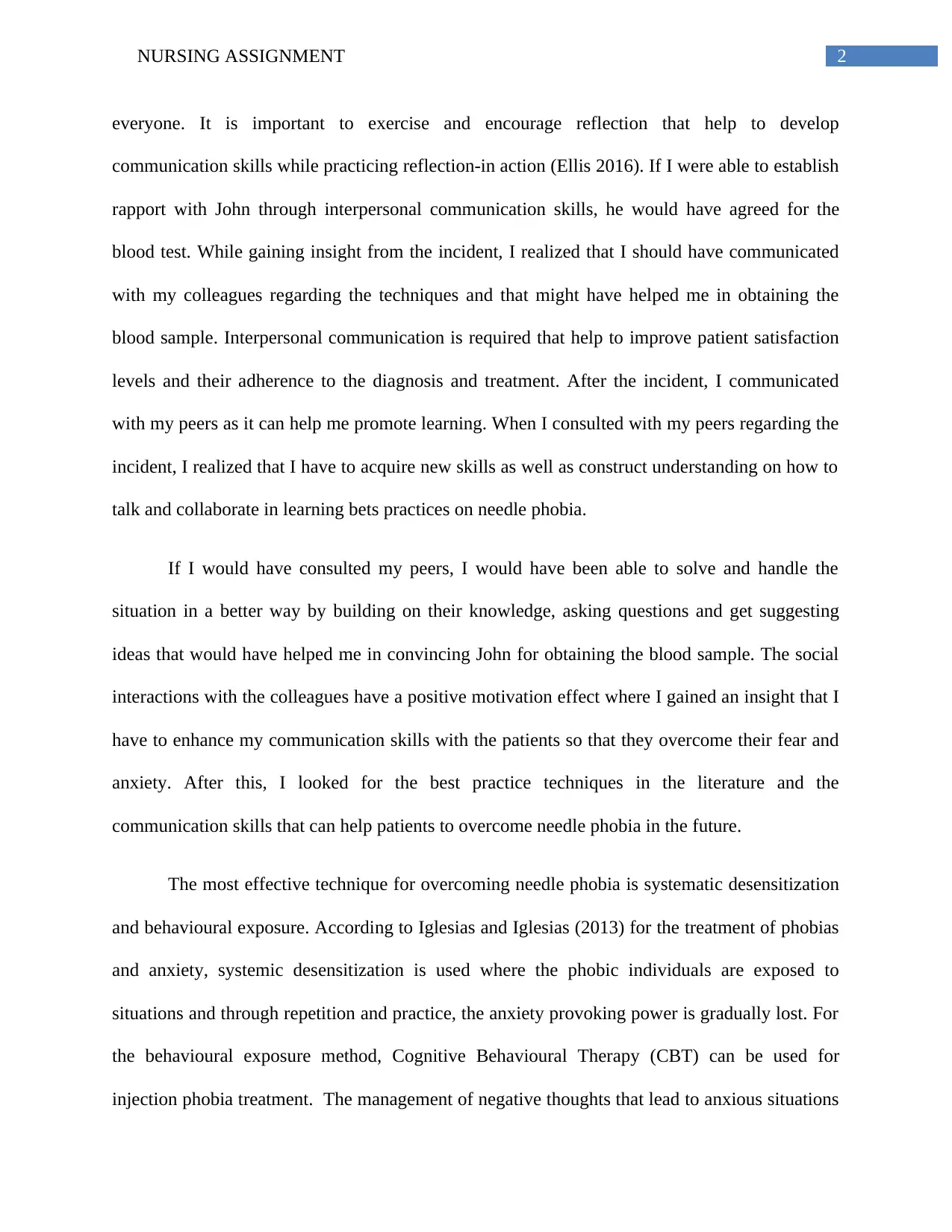
2NURSING ASSIGNMENT
everyone. It is important to exercise and encourage reflection that help to develop
communication skills while practicing reflection-in action (Ellis 2016). If I were able to establish
rapport with John through interpersonal communication skills, he would have agreed for the
blood test. While gaining insight from the incident, I realized that I should have communicated
with my colleagues regarding the techniques and that might have helped me in obtaining the
blood sample. Interpersonal communication is required that help to improve patient satisfaction
levels and their adherence to the diagnosis and treatment. After the incident, I communicated
with my peers as it can help me promote learning. When I consulted with my peers regarding the
incident, I realized that I have to acquire new skills as well as construct understanding on how to
talk and collaborate in learning bets practices on needle phobia.
If I would have consulted my peers, I would have been able to solve and handle the
situation in a better way by building on their knowledge, asking questions and get suggesting
ideas that would have helped me in convincing John for obtaining the blood sample. The social
interactions with the colleagues have a positive motivation effect where I gained an insight that I
have to enhance my communication skills with the patients so that they overcome their fear and
anxiety. After this, I looked for the best practice techniques in the literature and the
communication skills that can help patients to overcome needle phobia in the future.
The most effective technique for overcoming needle phobia is systematic desensitization
and behavioural exposure. According to Iglesias and Iglesias (2013) for the treatment of phobias
and anxiety, systemic desensitization is used where the phobic individuals are exposed to
situations and through repetition and practice, the anxiety provoking power is gradually lost. For
the behavioural exposure method, Cognitive Behavioural Therapy (CBT) can be used for
injection phobia treatment. The management of negative thoughts that lead to anxious situations
everyone. It is important to exercise and encourage reflection that help to develop
communication skills while practicing reflection-in action (Ellis 2016). If I were able to establish
rapport with John through interpersonal communication skills, he would have agreed for the
blood test. While gaining insight from the incident, I realized that I should have communicated
with my colleagues regarding the techniques and that might have helped me in obtaining the
blood sample. Interpersonal communication is required that help to improve patient satisfaction
levels and their adherence to the diagnosis and treatment. After the incident, I communicated
with my peers as it can help me promote learning. When I consulted with my peers regarding the
incident, I realized that I have to acquire new skills as well as construct understanding on how to
talk and collaborate in learning bets practices on needle phobia.
If I would have consulted my peers, I would have been able to solve and handle the
situation in a better way by building on their knowledge, asking questions and get suggesting
ideas that would have helped me in convincing John for obtaining the blood sample. The social
interactions with the colleagues have a positive motivation effect where I gained an insight that I
have to enhance my communication skills with the patients so that they overcome their fear and
anxiety. After this, I looked for the best practice techniques in the literature and the
communication skills that can help patients to overcome needle phobia in the future.
The most effective technique for overcoming needle phobia is systematic desensitization
and behavioural exposure. According to Iglesias and Iglesias (2013) for the treatment of phobias
and anxiety, systemic desensitization is used where the phobic individuals are exposed to
situations and through repetition and practice, the anxiety provoking power is gradually lost. For
the behavioural exposure method, Cognitive Behavioural Therapy (CBT) can be used for
injection phobia treatment. The management of negative thoughts that lead to anxious situations
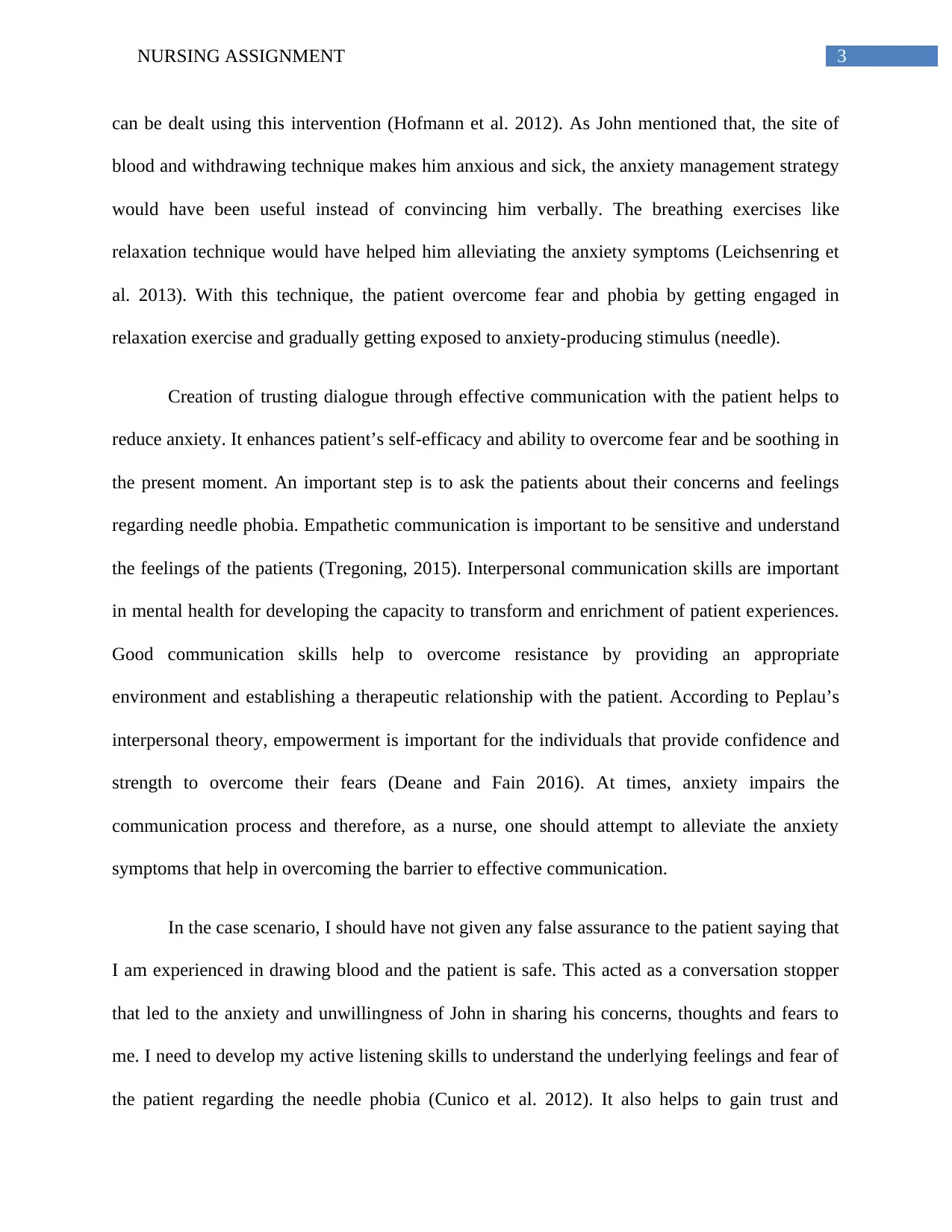
3NURSING ASSIGNMENT
can be dealt using this intervention (Hofmann et al. 2012). As John mentioned that, the site of
blood and withdrawing technique makes him anxious and sick, the anxiety management strategy
would have been useful instead of convincing him verbally. The breathing exercises like
relaxation technique would have helped him alleviating the anxiety symptoms (Leichsenring et
al. 2013). With this technique, the patient overcome fear and phobia by getting engaged in
relaxation exercise and gradually getting exposed to anxiety-producing stimulus (needle).
Creation of trusting dialogue through effective communication with the patient helps to
reduce anxiety. It enhances patient’s self-efficacy and ability to overcome fear and be soothing in
the present moment. An important step is to ask the patients about their concerns and feelings
regarding needle phobia. Empathetic communication is important to be sensitive and understand
the feelings of the patients (Tregoning, 2015). Interpersonal communication skills are important
in mental health for developing the capacity to transform and enrichment of patient experiences.
Good communication skills help to overcome resistance by providing an appropriate
environment and establishing a therapeutic relationship with the patient. According to Peplau’s
interpersonal theory, empowerment is important for the individuals that provide confidence and
strength to overcome their fears (Deane and Fain 2016). At times, anxiety impairs the
communication process and therefore, as a nurse, one should attempt to alleviate the anxiety
symptoms that help in overcoming the barrier to effective communication.
In the case scenario, I should have not given any false assurance to the patient saying that
I am experienced in drawing blood and the patient is safe. This acted as a conversation stopper
that led to the anxiety and unwillingness of John in sharing his concerns, thoughts and fears to
me. I need to develop my active listening skills to understand the underlying feelings and fear of
the patient regarding the needle phobia (Cunico et al. 2012). It also helps to gain trust and
can be dealt using this intervention (Hofmann et al. 2012). As John mentioned that, the site of
blood and withdrawing technique makes him anxious and sick, the anxiety management strategy
would have been useful instead of convincing him verbally. The breathing exercises like
relaxation technique would have helped him alleviating the anxiety symptoms (Leichsenring et
al. 2013). With this technique, the patient overcome fear and phobia by getting engaged in
relaxation exercise and gradually getting exposed to anxiety-producing stimulus (needle).
Creation of trusting dialogue through effective communication with the patient helps to
reduce anxiety. It enhances patient’s self-efficacy and ability to overcome fear and be soothing in
the present moment. An important step is to ask the patients about their concerns and feelings
regarding needle phobia. Empathetic communication is important to be sensitive and understand
the feelings of the patients (Tregoning, 2015). Interpersonal communication skills are important
in mental health for developing the capacity to transform and enrichment of patient experiences.
Good communication skills help to overcome resistance by providing an appropriate
environment and establishing a therapeutic relationship with the patient. According to Peplau’s
interpersonal theory, empowerment is important for the individuals that provide confidence and
strength to overcome their fears (Deane and Fain 2016). At times, anxiety impairs the
communication process and therefore, as a nurse, one should attempt to alleviate the anxiety
symptoms that help in overcoming the barrier to effective communication.
In the case scenario, I should have not given any false assurance to the patient saying that
I am experienced in drawing blood and the patient is safe. This acted as a conversation stopper
that led to the anxiety and unwillingness of John in sharing his concerns, thoughts and fears to
me. I need to develop my active listening skills to understand the underlying feelings and fear of
the patient regarding the needle phobia (Cunico et al. 2012). It also helps to gain trust and
Secure Best Marks with AI Grader
Need help grading? Try our AI Grader for instant feedback on your assignments.
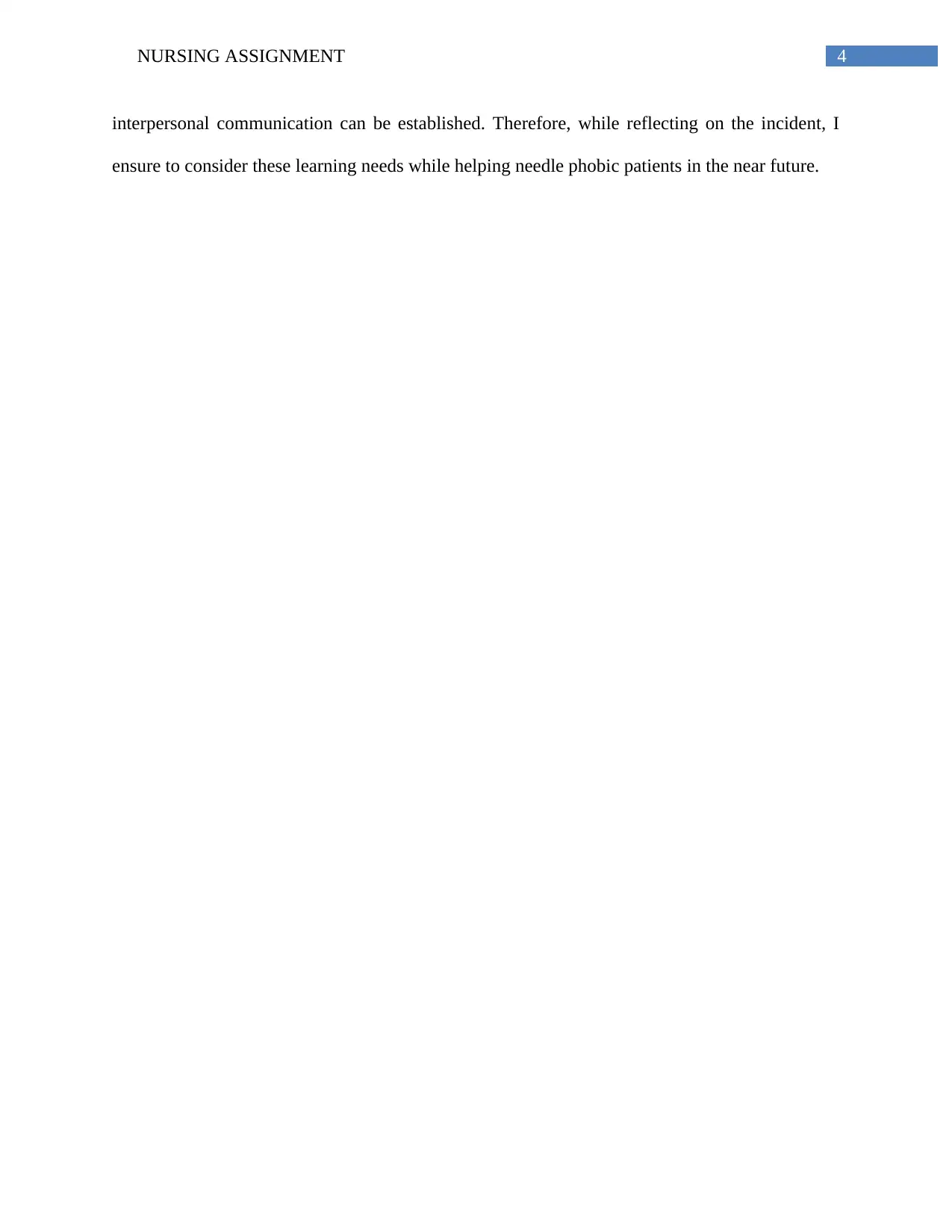
4NURSING ASSIGNMENT
interpersonal communication can be established. Therefore, while reflecting on the incident, I
ensure to consider these learning needs while helping needle phobic patients in the near future.
interpersonal communication can be established. Therefore, while reflecting on the incident, I
ensure to consider these learning needs while helping needle phobic patients in the near future.
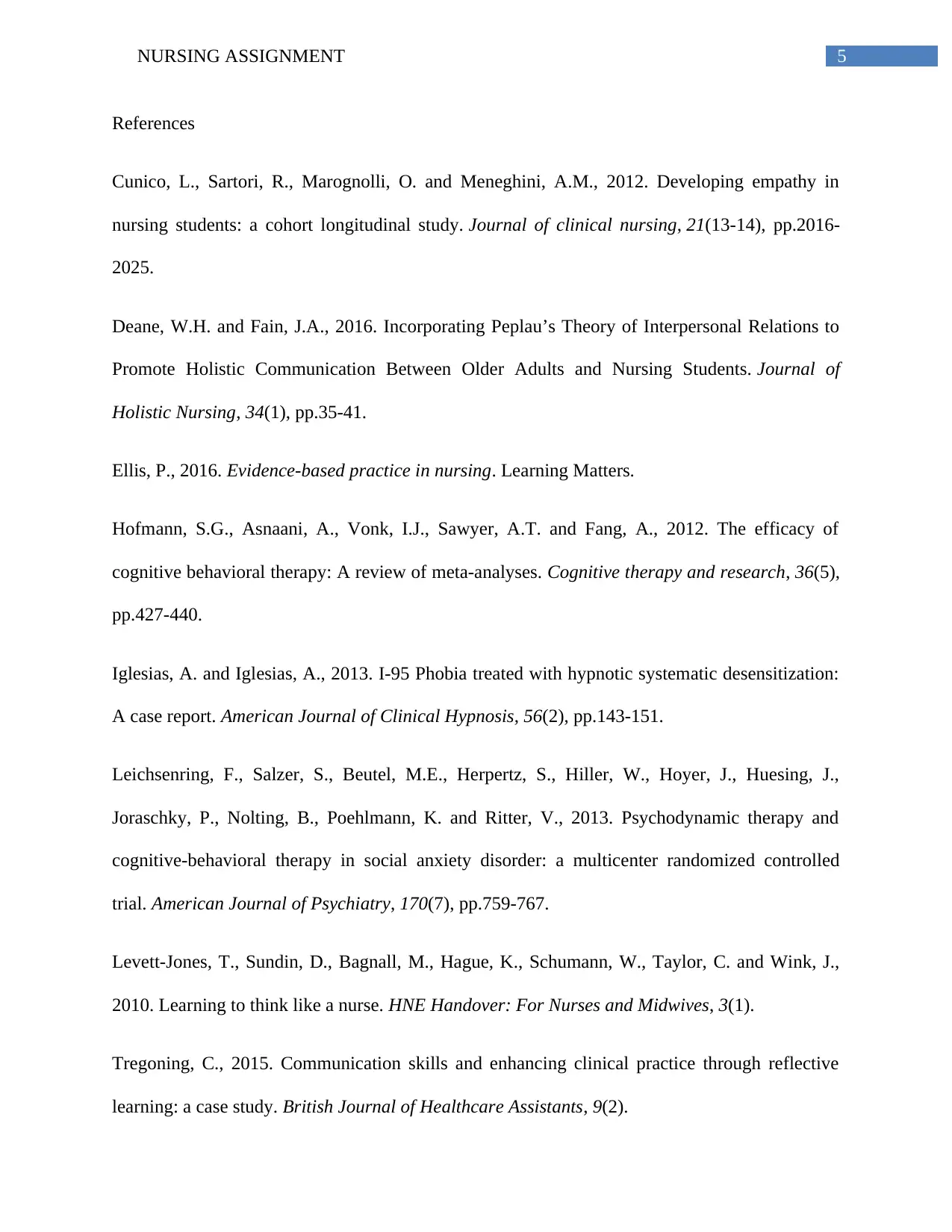
5NURSING ASSIGNMENT
References
Cunico, L., Sartori, R., Marognolli, O. and Meneghini, A.M., 2012. Developing empathy in
nursing students: a cohort longitudinal study. Journal of clinical nursing, 21(13-14), pp.2016-
2025.
Deane, W.H. and Fain, J.A., 2016. Incorporating Peplau’s Theory of Interpersonal Relations to
Promote Holistic Communication Between Older Adults and Nursing Students. Journal of
Holistic Nursing, 34(1), pp.35-41.
Ellis, P., 2016. Evidence-based practice in nursing. Learning Matters.
Hofmann, S.G., Asnaani, A., Vonk, I.J., Sawyer, A.T. and Fang, A., 2012. The efficacy of
cognitive behavioral therapy: A review of meta-analyses. Cognitive therapy and research, 36(5),
pp.427-440.
Iglesias, A. and Iglesias, A., 2013. I-95 Phobia treated with hypnotic systematic desensitization:
A case report. American Journal of Clinical Hypnosis, 56(2), pp.143-151.
Leichsenring, F., Salzer, S., Beutel, M.E., Herpertz, S., Hiller, W., Hoyer, J., Huesing, J.,
Joraschky, P., Nolting, B., Poehlmann, K. and Ritter, V., 2013. Psychodynamic therapy and
cognitive-behavioral therapy in social anxiety disorder: a multicenter randomized controlled
trial. American Journal of Psychiatry, 170(7), pp.759-767.
Levett-Jones, T., Sundin, D., Bagnall, M., Hague, K., Schumann, W., Taylor, C. and Wink, J.,
2010. Learning to think like a nurse. HNE Handover: For Nurses and Midwives, 3(1).
Tregoning, C., 2015. Communication skills and enhancing clinical practice through reflective
learning: a case study. British Journal of Healthcare Assistants, 9(2).
References
Cunico, L., Sartori, R., Marognolli, O. and Meneghini, A.M., 2012. Developing empathy in
nursing students: a cohort longitudinal study. Journal of clinical nursing, 21(13-14), pp.2016-
2025.
Deane, W.H. and Fain, J.A., 2016. Incorporating Peplau’s Theory of Interpersonal Relations to
Promote Holistic Communication Between Older Adults and Nursing Students. Journal of
Holistic Nursing, 34(1), pp.35-41.
Ellis, P., 2016. Evidence-based practice in nursing. Learning Matters.
Hofmann, S.G., Asnaani, A., Vonk, I.J., Sawyer, A.T. and Fang, A., 2012. The efficacy of
cognitive behavioral therapy: A review of meta-analyses. Cognitive therapy and research, 36(5),
pp.427-440.
Iglesias, A. and Iglesias, A., 2013. I-95 Phobia treated with hypnotic systematic desensitization:
A case report. American Journal of Clinical Hypnosis, 56(2), pp.143-151.
Leichsenring, F., Salzer, S., Beutel, M.E., Herpertz, S., Hiller, W., Hoyer, J., Huesing, J.,
Joraschky, P., Nolting, B., Poehlmann, K. and Ritter, V., 2013. Psychodynamic therapy and
cognitive-behavioral therapy in social anxiety disorder: a multicenter randomized controlled
trial. American Journal of Psychiatry, 170(7), pp.759-767.
Levett-Jones, T., Sundin, D., Bagnall, M., Hague, K., Schumann, W., Taylor, C. and Wink, J.,
2010. Learning to think like a nurse. HNE Handover: For Nurses and Midwives, 3(1).
Tregoning, C., 2015. Communication skills and enhancing clinical practice through reflective
learning: a case study. British Journal of Healthcare Assistants, 9(2).
1 out of 6
Related Documents
Your All-in-One AI-Powered Toolkit for Academic Success.
+13062052269
info@desklib.com
Available 24*7 on WhatsApp / Email
![[object Object]](/_next/static/media/star-bottom.7253800d.svg)
Unlock your academic potential
© 2024 | Zucol Services PVT LTD | All rights reserved.





